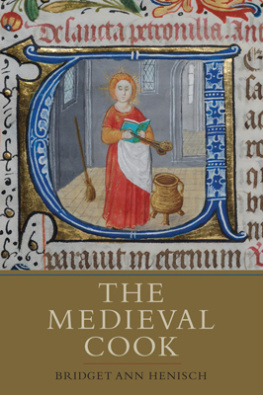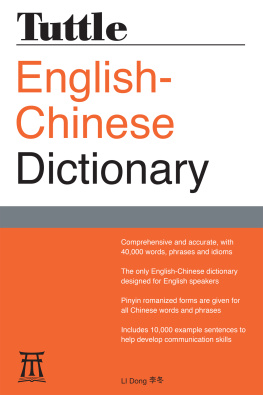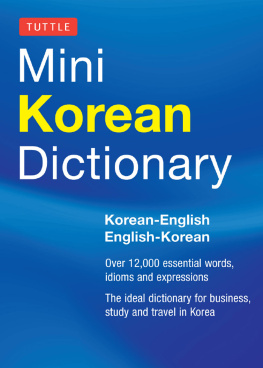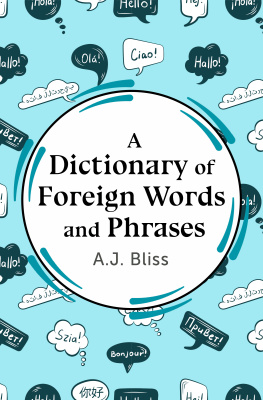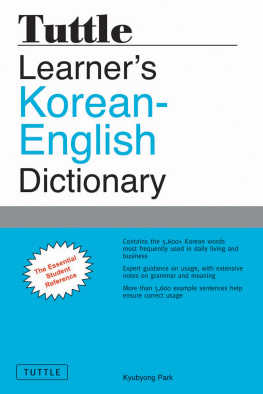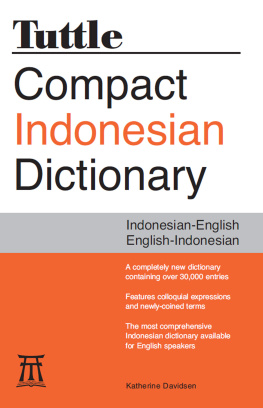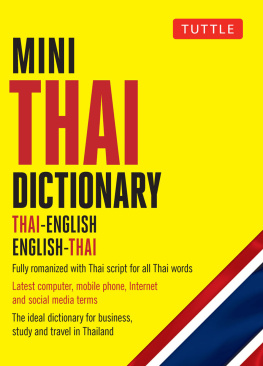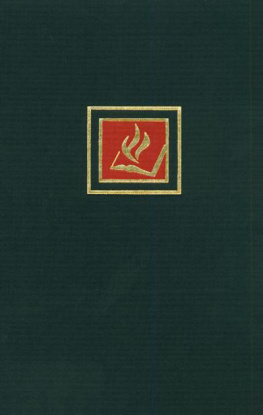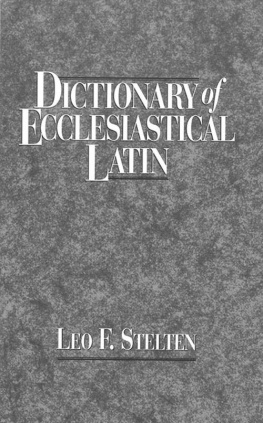
in memoriam
V.E.N.
S.C.S.
An interest in the middle ages often brings the non-specialist reader up short against a word or term which is not understood or only imperfectly understood. This dictionary is intended to put an end to all that: it has been designed to be of real help to general readers and specialists alike.
The dictionary contains some 3,400 terms as headwords, ranging from the legal and ecclesiastic to the more prosaic words of daily life. Latin was the language of the church, law and government, and many Latin terms illustrated here are frequently found in modern books of history of the period; similarly, the precise meaning of Old English and Middle English terms may elude today's reader: this dictionary endeavours to provide clarity. In addition to definition, etymologies of many words are given, in the belief that knowing the origin and evolution of a word gives a better understanding. There are also examples of medieval terms and phrases still in use today, a further aid to clarifying meaning.
CHRISTOPHER COREDON has also compiled the Dictionary of Cybernyms . Dr ANN WILLIAMS, historical consultant on the project, was until her retirement Senior Lecturer in medieval history at the Polytechnic of North London.
Will attract any student and teacher and librarian keen to get a reasonably-priced all-purpose quick reference guide to some 3,000-4,000 terms regularly used in, and often found in, sources from and about the Middle Ages. [] A dictionary, then, very clear to use, general-purpose as well as a useful desk-source for the expert, and suitable for the academic library where the medieval period is seriously studied. LIBRARY REVIEW.
A superb example of clarity and concisionwith a generous and readable layout. TLS
[Intended] to provide the enthusiast with a guide to medieval language. It succeeds magnificently. [] It is an invaluable resource. HISTORICAL NOVELS REVIEW.
Whoever reads about medieval subjects will wish to own this handy and reliable reference work, and all reference libraries should have it. INTERNATIONAL REVIEW OF BIBLICAL STUDIES.
Has many good points; [and is] a pleasure to browse through. [] More than fulfils its promise to be of assistance to any non-academic reader of history and as such should be on the shelf of all avid readers of medieval history. JOURNAL of the AUSTRALIAN EARLY MEDIEVAL ASSOCIATION.

PREFACE
In recent years, history has become the focus of increasing popular interest, both in book form and on television. This dictionary is intended not for historiographers (who will not need it) but rather for the readers of history who are neither specialists nor academically trained.
There is an astonishing amount of material that is readily available today. Domesday Book can be bought in a modern translation, in one paperback volume, for less than the cost of a ticket to a football match all two million words. There are paperback editions of texts of the period, in which the voice of the time can still be heard, while Bracton is easily accessible on the Internet. And there is, of course, the literature. From Geoffrey of Monmouth to Chaucer, to Thomas Malory it is all available, sometimes in modern English, and there the imagination of the past can be seen and heard at work. The people are recognisable. Chaucer is subject to adaptations which attempt to make him relevant: but modernisation strips his characters of just what it is that makes them recognisably flesh-and-blood human beings: their voice and milieu. Malorys Morte DArthur was being printed by Caxton in the same year as the Battle of Bosworth, 1485: a decisive exposition of the Arthurian legend which had persisted throughout this period appeared simultaneously with the battle which was the last of the era we call medieval.
The period can be made to look very good, even glamorous, with well-chosen pictures. Iconic knights in armour on gorgeously arrayed horses, the castles and tournaments, the brightly coloured clothing of the men and women of the nobility, so rich in comparison with ours, so unlike that of the little-seen peasantry all provide evocative images. But all that they thought and believed was utterly different, even alien, to our ways of thought and belief. The Church and its place in the lives of those people, its power over actions and its intimate place in daily life and thought is just one such profound difference among many.
The medieval period is separated from us by language as much as time. This was a time of languages: English, French and Latin. English, and its several dialects, was spoken by the majority; French/Anglo-Norman was the language of power, while Latin was used by scholars here and throughout Europe and in the writing of history and the making of records, e.g. the rolls which record government business. Therefore this dictionary includes words and terms in those languages, because to write about the past, the modern historian must use the terms and language used in that past. Inevitably, the non-specialist reader encounters words which are either unfamiliar or, more often, words being used which are sort of understood, are familiar, but which, when checked, turn out to have unexpected meanings. In an attempt to aid a better understanding of these terms, an etymology has been given to many of them: the unfamiliar becomes clearer if one can see something of its origin. However, no claim to originality is being made by including etymologies. All have been checked against those offered in The Oxford English Dictionary and Onionss The Oxford Dictionary of English Etymology . They have been placed at the end of each definition, so as not to obtrude.
So far as possible, persons have been kept out of definitions. Bede ( c. 673 735), Geoffrey of Monmouth ( c. 110054) and the great chronicler and court historian, Jean Froissart ( c. 13331400/01), are mentioned, as is John Wyclif ( c. 133084). Fortunately, historical terms do not rely upon individuals. However, the time of their use is important and therefore monarchs are named without hesitation. (For those who are a little uncertain about the regnal dates of the Henrys and Edwards, and others, a list has been appended.) To include less familiar names without an entry and details of their life would be unhelpful; information on those few which are included should be readily available.
ACKNOWLEDGEMENTS
Thanks are due to David Ferris, Curator of Rare Books and Manuscripts at Harvard Law Library, for permission to quote from their on-line edition of Bractons De Legibus et Consuetudinibus Angli . This site gives both the Latin text and an English translation. The URL of the home page is: http://hlsl5.law.harvard.edu/bracton/index.htm, where there can be found details about both text and translation.
I wish to express my great debt of gratitude to Dr Ann Williams, who kindly read this dictionary in its final stages, at a time of ill-health and when she was occupied with valuable work of her own. The lightness with which she wore her scholarship only enhanced her suggestions and made her corrections a pleasure which learning always should be. This dictionary is much improved as a result of her scrutiny. Further thanks are owed to Clive Tolley for his editorial rigour and his kotkansilm . Obviously, errors that remain are mine. Thanks are also due to PHG for encouragement and an easy hand when pouring drinks.
ABBREVIATIONS
| abbr. | abbreviation, abbreviated |
| AL | Anglo-Latin |
| AN | |
Next page
